Rethink Equality in Moroccan Agriculture
UM6P Impact | Science in Action #06
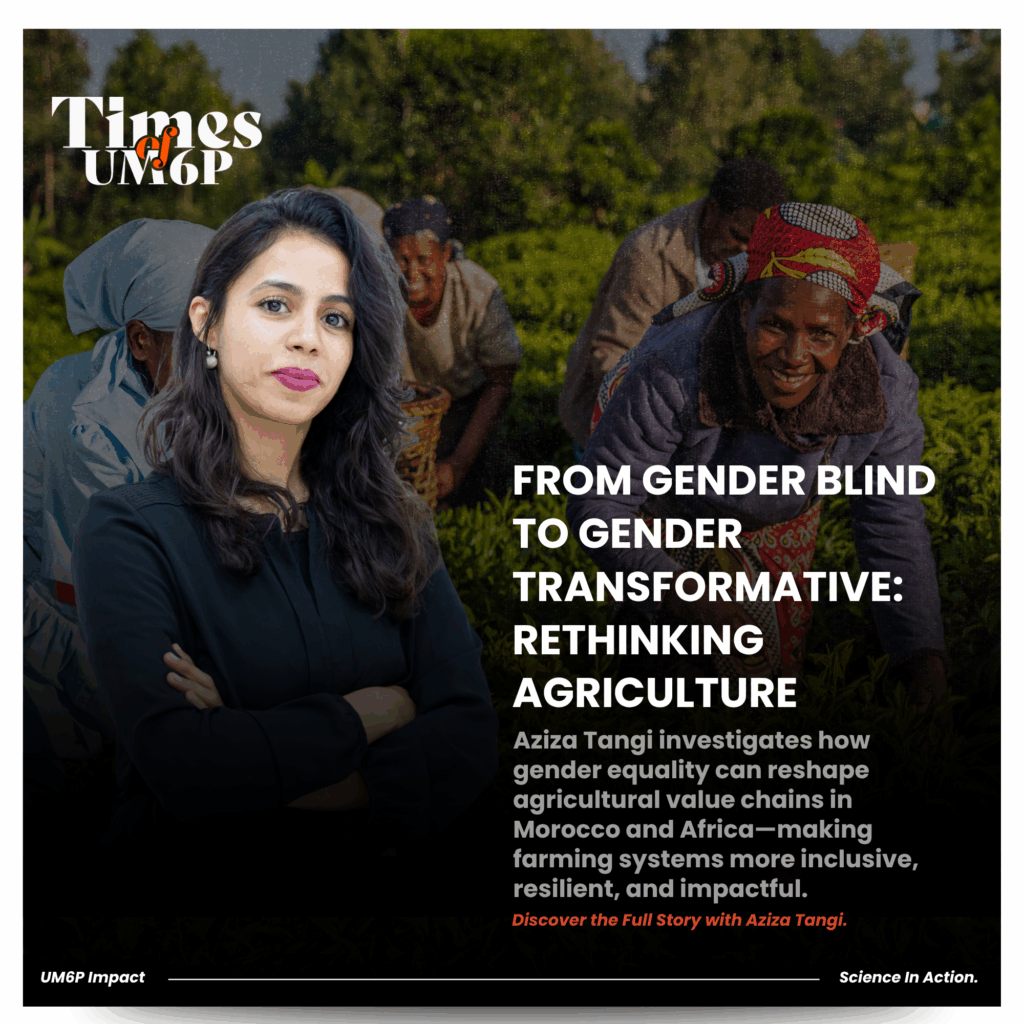
Gender equality, as defined in Sustainable Development Goal 5, is not just a stand-alone objective, but cuts across all 17 SDGs in the 2030 Agenda, encompassing 45 targets and 54 indicators specifically tied to gender. In agriculture, this means more than balancing numbers; it requires transforming the way systems are designed, accessed, and governed.
While Morocco’s rural women remain vital actors in agricultural production, systemic gender inequalities still limit their access to land, resources, and decision-making power. In this edition of Science in Action, we invited Aziza Tangi, a dedicated agronomist and PhD candidate, to explore how these global principles translate into local realities, particularly within Moroccan agricultural value chains, where gender remains both a challenge and a catalyst for innovation.
Her work goes beyond research. It’s a call to rethink agricultural systems through a gender lens to transform the way rural development is understood and implemented in dryland areas.
Meet Aziza Tangi: Agronomist and Advocate for Inclusive Agriculture
Aziza Tangi is an agronomist and fourth-year PhD candidate at the Agricultural Innovation and Technology Transfer Center (AITTC) of UM6P, working in collaboration with the African Plant Nutrition Institute (APNI).
Her research focuses on enhancing women’s roles in Morocco’s smallholder olive value chains, a critical and strategic sector for Moroccan agriculture.
Alongside her academic journey, Aziza continues to serve as a research and development engineer, contributing to site rehabilitation, cacti conservation, experimental farm development, and agro-innovation across Africa.
Her passion for gender issues was ignited by APNI’s earlier work on women-led milk value chains in North and West Africa.
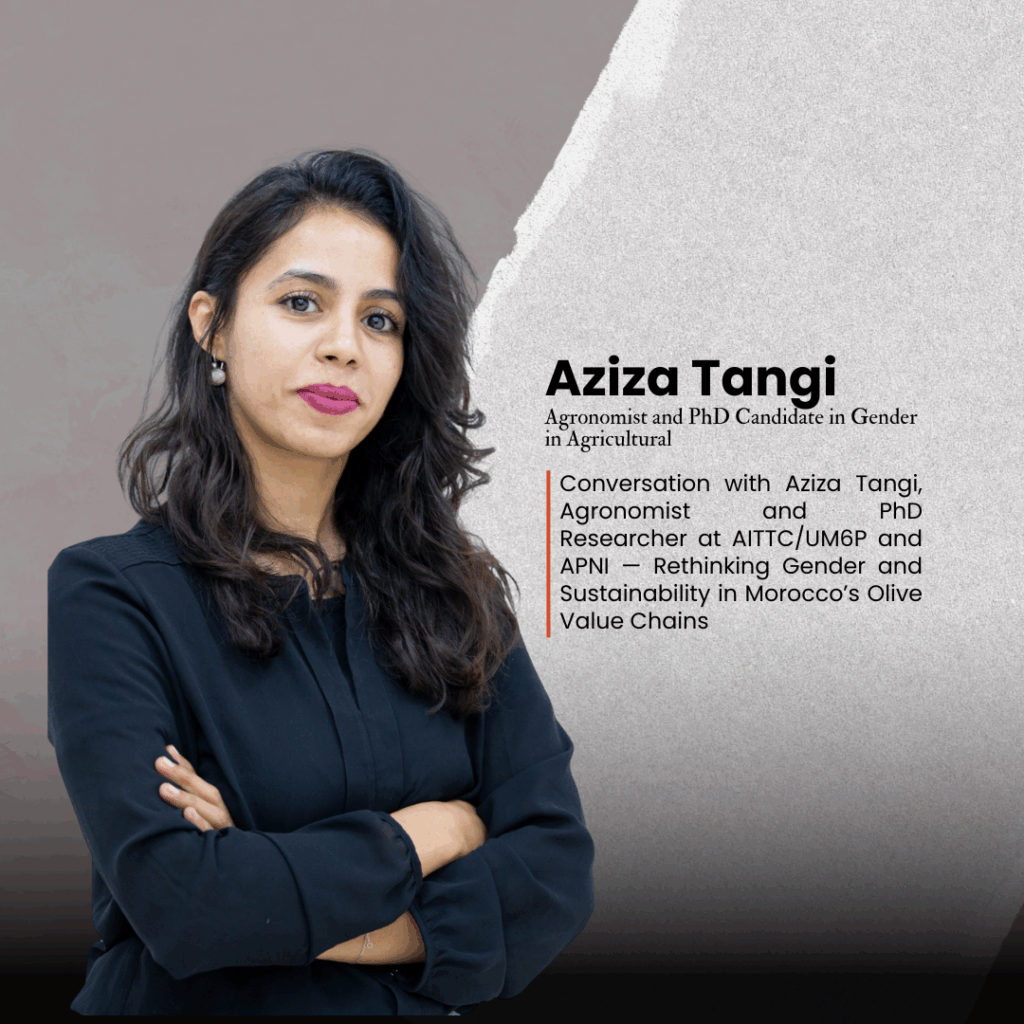
From Engineering to Empowerment: Aziza Tangi’s Academic and Professional Journey
I am an agricultural engineer at the College of Sustainable Agriculture and Environmental Sciences (CSAES) of UM6P and currently a fourth-year PhD candidate in collaboration with APNI.
I obtained my degree in Seeds and Plant Production Engineering from Hassan II Agronomic and Veterinary Institute in Rabat in 2015. After graduating, I started working at Zetta Engineering in Laayoune in 2016, where I was involved in hydro-agricultural construction, landscaping, and environmental impact assessments. In 2018, I helped establish an agricultural farm in Dakhla.
I joined AITTC at UM6P in February 2019. My missions cover rehabilitating mining sites, species conservation (mainly cacti), landscaping, propagation, and the establishment of experimental farms in Africa.
My interest in gender issues in agriculture emerged from APNI’s project “Enhancing the Resilience of Smallholder Farms in North and West Africa through Upgrading of Women-Managed Milk Value Chains,” which sparked my curiosity regarding the persistence of gender inequalities in African agriculture.
My PhD research focuses on improving opportunities for women within smallholder olive value chains in Morocco.
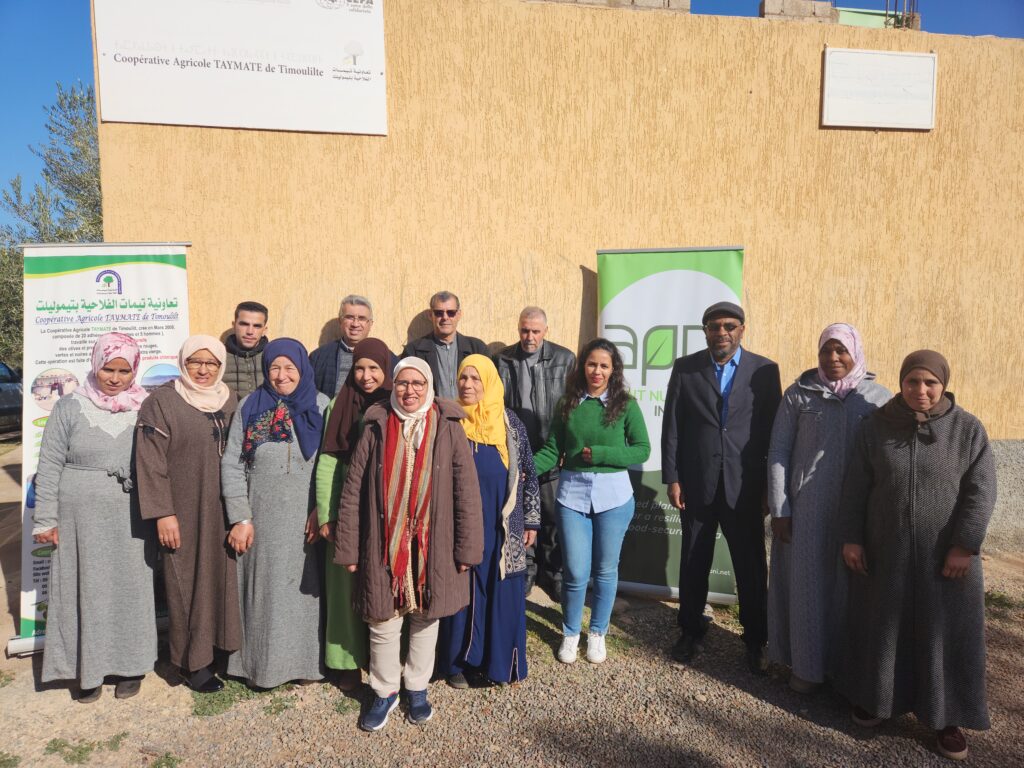
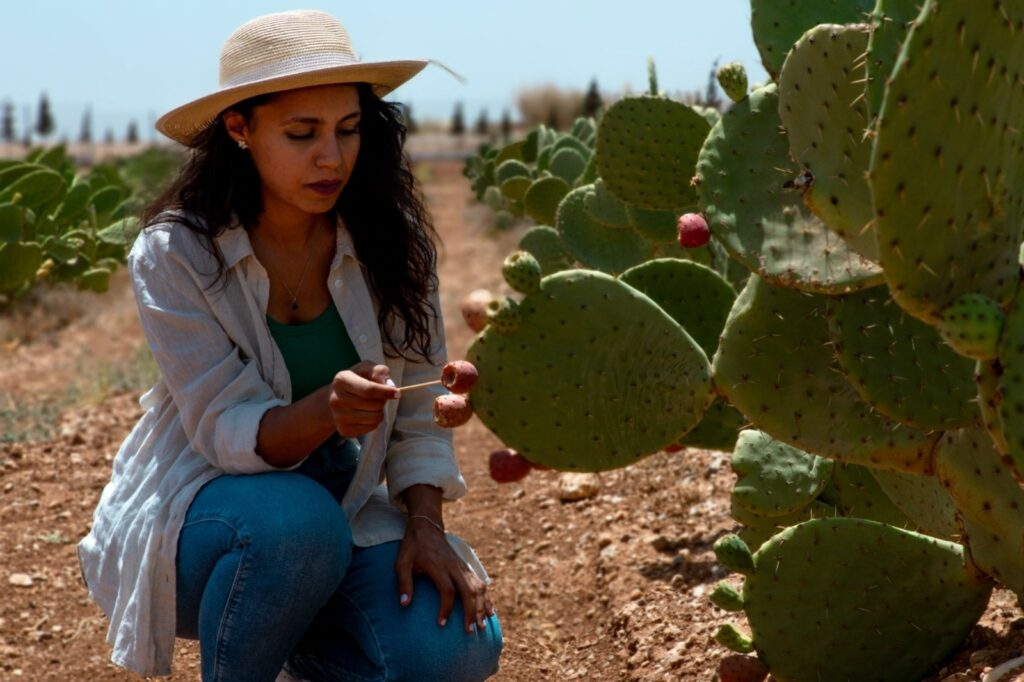
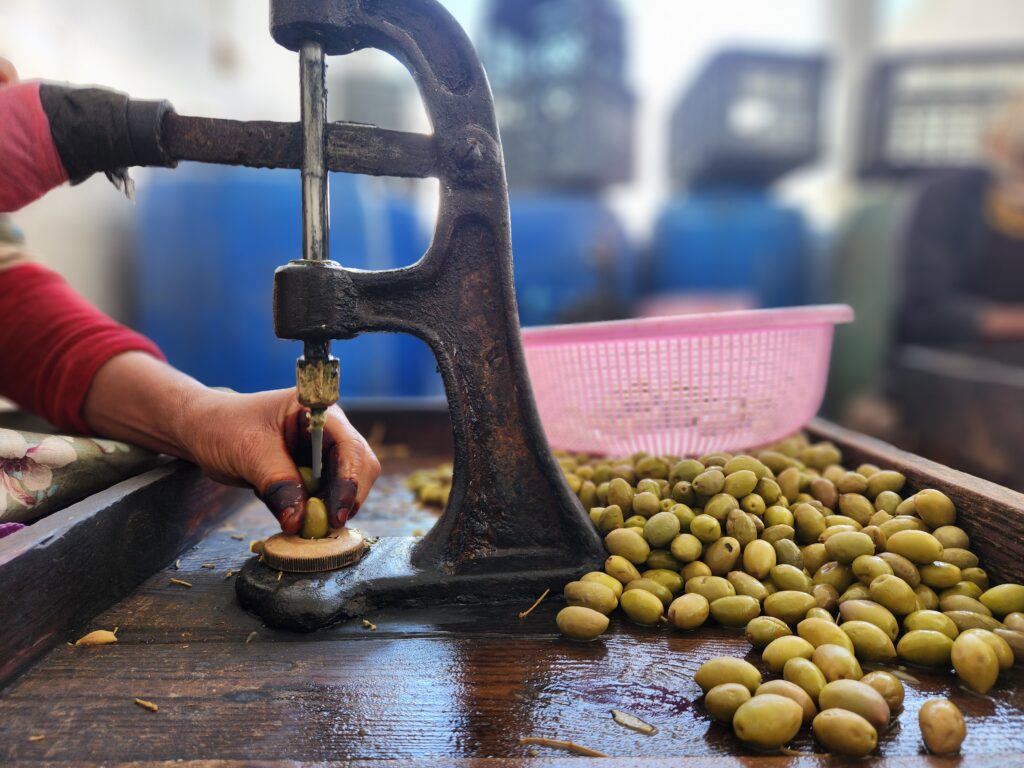
Olive Value Chains Under the Lens: The Focus of Aziza’s PhD Research
My PhD research project is part of the fruitful collaboration between the African Plant Nutrition Institute (APNI) and the Agricultural Innovation and Technology Transfer Center (AITTC), specifically within the framework of APNI’s Resilient Agriculture for African Drylands (RAFAD) Initiative.
Understanding gender dynamics is vital for building resilience in African dryland agriculture. Women play a crucial role in resilience through contributions to food production, agro-biodiversity preservation, unique adaptation strategies, and active community engagement. A gendered perspective is essential for developing effective climate adaptation strategies.
Tackling gender inequalities—particularly in women’s limited access to resources, education, job opportunities, and decision-making power—can enhance the resilience of agricultural systems in these areas.
Hence, APNI is developing a research project focused on improving opportunities for women within smallholder olive value chains (OVC) in Morocco. The project aims to:
Understand how gender inequalities impede women’s participation and empowerment in the OVC.
Identify and design targeted gender-transformative interventions to help women overcome these hurdles.
This study will add value by proposing potential pathways that benefit both men and women engaged in the OVC, contributing to the chain’s overall success and profitability.
It will also provide actionable insights for Moroccan decision-makers and value chain stakeholders to inform future transformative programs for a sustainable and inclusive agricultural value chain.
When Inequality Takes Root: Women’s Limited Access in Moroccan Agriculture
The agricultural sector in Morocco depends heavily on women, who are an important component of the rural workforce and play a key role in crop production and livestock management. This reliance increases their vulnerability to climate change and other hazards.
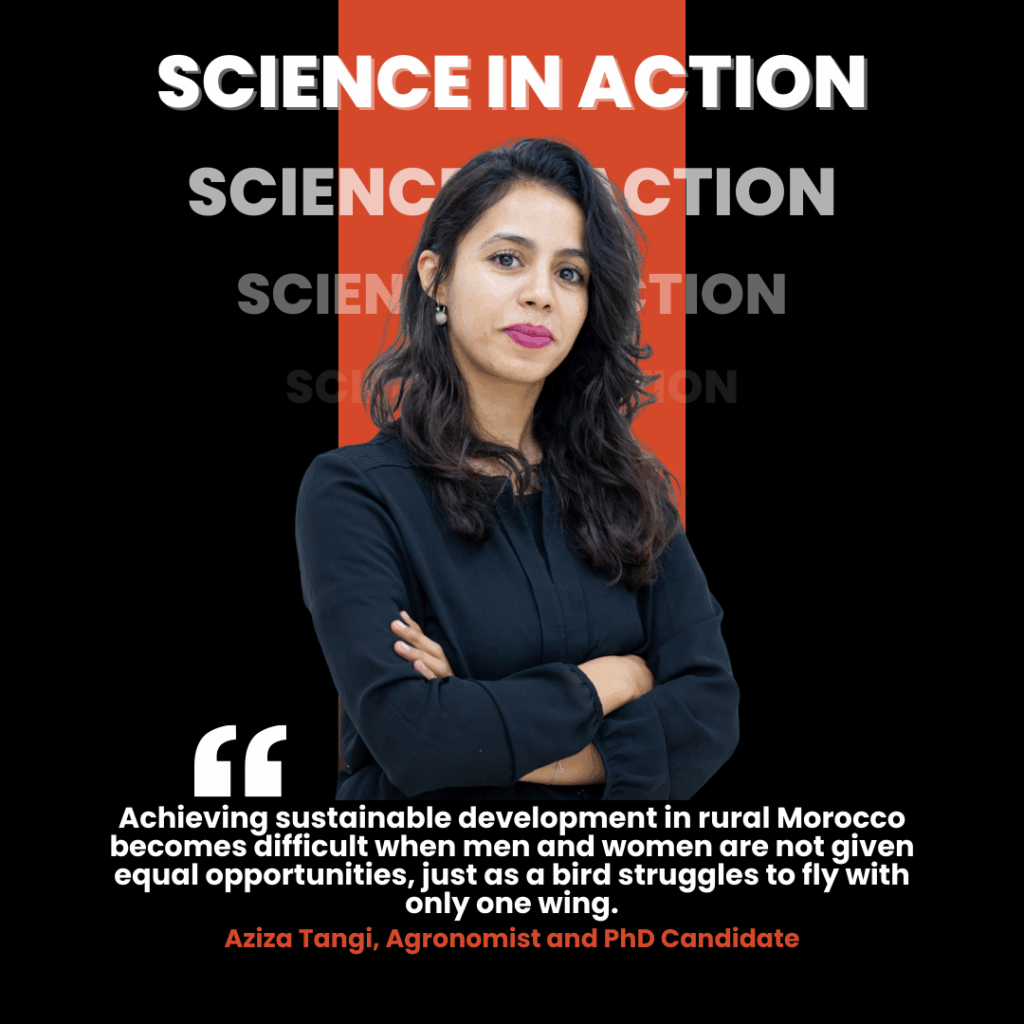
However, women’s roles and contributions are often overlooked due to persistent gender power imbalances, reflected in unequal access to resources, employment, education, and decision-making opportunities. Only 6.9% of women own agricultural land (HCP, 2023), limiting their ability to invest in or secure credit.
Access to agricultural training and extension services is also limited, largely due to low education levels, which hampers women’s productivity. Women in the agricultural workforce are often concentrated in low-wage, seasonal roles without contracts or social protections, resulting in significantly lower earnings than their male counterparts.
In addition, women contribute substantial unpaid labor—efforts that remain unrecognized and undervalued. These disparities, along with other socio-economic and structural barriers, limit women’s empowerment and undermine efforts toward sustainable agricultural development.
Gender equality: What is it, and how does it relate to sustainable development and agriculture?
Gender equality means that every person, no matter what their gender, has the freedom to develop their abilities and make choices without being constrained by stereotypes, rigid gender roles, or biases. It does not suggest that women and men need to be the same, but rather that their rights, responsibilities, and opportunities should not depend on whether they are born male or female.
Gender inequality in agriculture is complex and multifaceted, and it is the reflection of power imbalances between men and women. Gender equality and women’s empowerment (SDG 5) can act as a strategic policy lever that drives progress across the entire 2030 Sustainable Development Agenda. In Morocco, closing the gender gap by improving access to health services (SDG 3) and education (SDG 4), along with ensuring equal opportunities for women in decision-making and access to productive resources, can help reduce poverty (SDG 1) and enhance food security (SDG 2). It is also key for promoting economic growth (SDG 8), strengthening resilience to climate change (SDG 13), and advancing social justice (SDG 16).
Toward a Fairer Future: What Needs to Change to Empower Women in Agriculture
Gender-blind policies that prioritize economic gain while overlooking the complexities of gender dynamics cannot address women’s disempowerment in agriculture. Only a gender-transformative approach, which addresses the root causes of gender inequality, can.
Achieving gender equality in Moroccan agriculture requires comprehensive changes, including legal reforms and grassroots initiatives.
Additionally, it demands policies and gender-transformative interventions that benefit both women and men, within and beyond the agricultural sector, addressing areas such as education, health, infrastructure, and finance.
More gender-disaggregated data is required for inclusive interventions, as gaps in gender data significantly constrain the development and implementation of agricultural programs and policies.
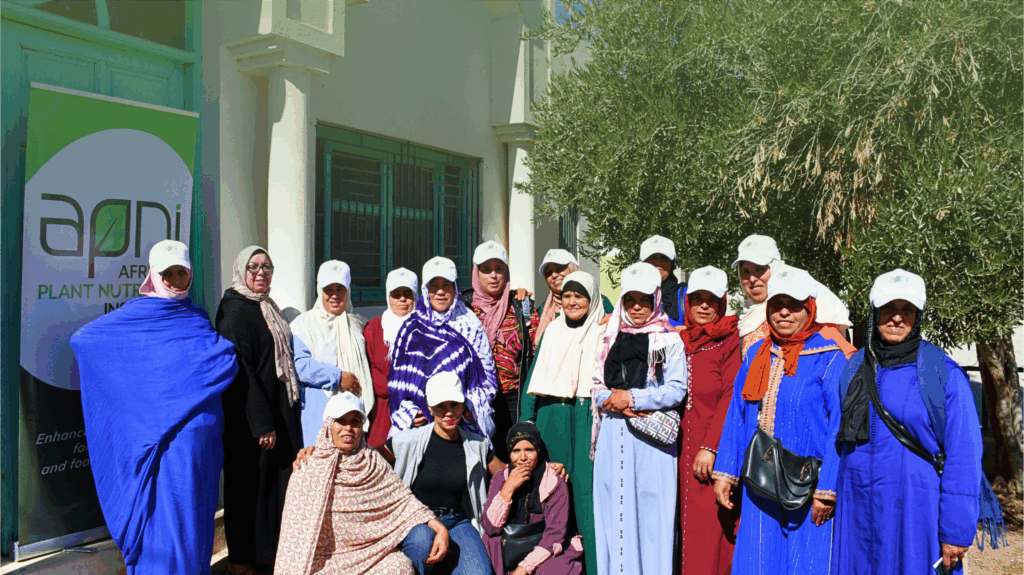
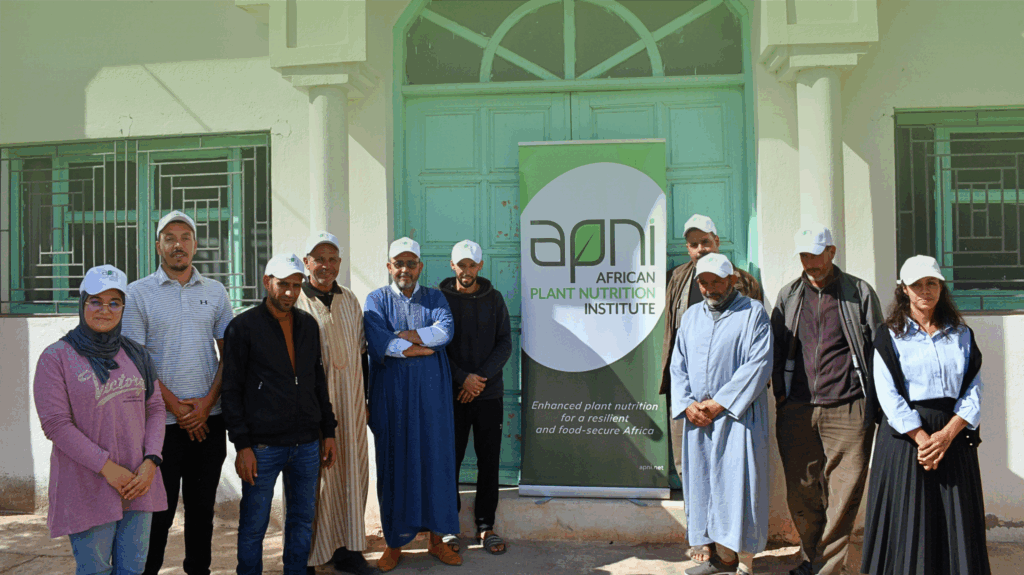
A Call to Rethink Rural Development
This research shows that gender-transformative approaches in agriculture are more than social correctives—they are essential strategies for resilience, equity, and long-term sustainability. By placing women at the heart of value chain transformation, Aziza Tangi’s work offers new pathways for rural development and climate adaptation in Morocco.
To dive deeper into her work and its impact:
Discover Aziza Tangi’s profile and research journey
Her biography, research background, and contributions to inclusive agriculture are available in the
Read the full research article:
Improving Opportunities for Women in Smallholder Olive Value Chains in Morocco
Explore the field experience:
The Taymate Cooperative—A Women-led Empowerment Story

Leave a Reply